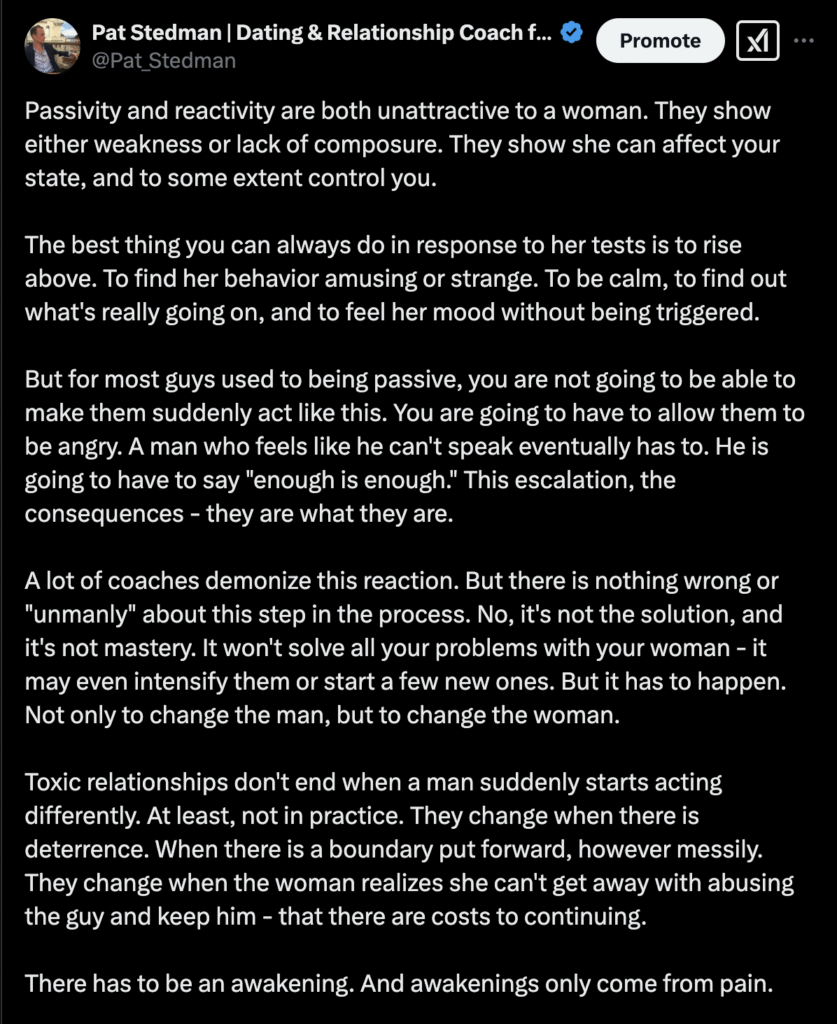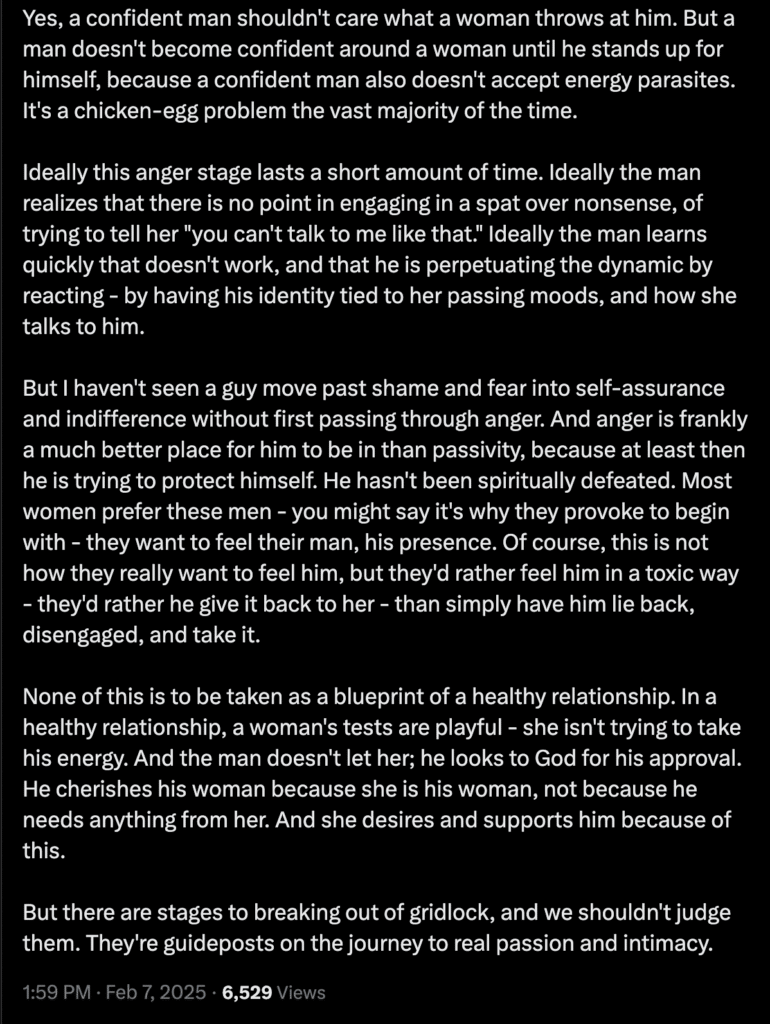So I saw something pretty embarrassing on X the other day — something unfortunately a little too a common.
It was Christian account, which posted a video of a woman picking a fight and berating her husband, and unsurprisingly, the husband was basically just taking it. The caption was extremely submissive: “The only answer is, ‘I’m sorry babe, continue (insert gay emoji)’”

I have to say, I hate this kind of stuff with a passion. I understand women get like this sometimes when they really feel disconnected and unappreciated from their man, and are in their emotions. I also understand that it is a symptom of a relationship that is not firing on all cylinders. The man’s own behavior plays a role in it, often a significant one.
But I don’t like the normalization of these kind of energy-draining exchanges. I don’t like seeing Christian men talk about their wives nagging or attacking them like it’s OK. These are parasitic and pathetic dynamics; to somehow justify them shows a lack of self-respect and weakness.
That said, let’s get practical and see where the guy is making mistakes.
The first thing is trying to explain himself. I agree with the caption in this sense: the talking doesn’t help, and the correcting actually comes across as a passive-aggressive sort of arguing. Yes, she’s being ridiculous, but his best bet is to just stop talking. Let her go on. If she asks why you’re quiet, tell her you’re waiting for her to talk. Patience is required.
(Where I don’t agree is in the apology. Why apologize when you have no idea if you’ve done anything wrong? It sets a bad precedent and concedes off the bat that you are the bad guy. This is “beta-programming” and perpetuates these kind of dynamics. I’ve yet to see a guy whose modus-operandi is “apologize” when his wife nags receive any kind of respect in the relationship. Apologize when you have a reason to, but don’t offer it cheaply to placate her.)
It’s hard to know in this example exactly what the problem is, because egos got involved and everything went off the rails — we don’t even know what she’s irritated about. But being quiet and encouraging her to talk is probably enough to resolve the problem. You can participate in “active listening” — paraphrasing what she’s saying and repeating the content and her feelings back so she feels heard — and then getting to the root of where her emotional gripe lies. Then once she’s vented, if you’ve actually done something wrong, you can apologize for it — or at least explain things from your end, and come to some sort of understanding / solution.
This is known as “being her rock.” You’re not getting caught up in her emotions; you’re helping her to find her way out of them. You’re giving her the presence she needs, without being reactive. Add in a little amused mastery, and you can make this conversation go even better, and even turn the negative positive — make it flirty. This ability to navigate her emotions is also how you develop trust with her. The more she feels heard and understood by you, the less frequent or intense these conversations are going to be.
But the reality is that most dysfunctional relationships don’t progress automatically to health like this. In most of these marriages you have a passive husband who — while certainly not perfect — nevertheless gets criticized more or less for the crime of existing. His woman is unhappy and takes all her negative feelings out on him, often completely unfairly and irrationally. She’s not simply moody; she insulting. He becomes quiet not because he knows how to handle her, but because he’s afraid and desperately wants her approval. He’s a beaten dog who just wants to stop being yelled at.
It was with this dynamic in mind that I made the following post about the typical necessity of anger in breaking dysfunctional patterns:


I don’t want to reiterate the post, but I want to clarify I’m not saying it’s good to yell, shout, argue — and certainly not to be violent. In fact, I am actually not endorsing any “action” as a result of anger; I am simply saying anger as an emotion is inevitable in the creation of boundaries, because anger is an “emotional immune response” to your boundaries behind violated. It is the equivalent of inflammation in dealing with infection: beneficial when it’s contained and acute; toxic when it’s systemic and chronic.
When a man gets angry that a woman is treating him badly, a window for his life to change presents itself. Note that I didn’t say it will change, or will always change for the better. Anger can also be a trap. Misdirected anger overreaches, and can often send you right back into shame, starting the abuse cycle all over again. This is why I think some people viewed this post with skepticism; when a man escalates conflict with a woman for the first time, it can make things worse. Negative words exchanged, and certainly violence, break the trust further — the foundation of the relationship deteriorates. The only silver lining is that on a certain level, women do respect men more who push back against them. I am saying this in a relative sense; this kind of “push back” doesn’t make women truly respect you, and it definitely doesn’t make them feel safe with you. But women can sense when they have dominated a man’s spirit and when they haven’t. Fighting back against a woman’s bad behavior maintains a level of desire for you, although depending on how far you go, it will also sacrifice comfort in the process.
The most unhealthy expressions of anger come in the form of cruel, humiliating comments and physical violence. I can tell you, especially as a man, that these are incredibly dangerous and rewardless paths to go down. No it’s not “fair,” but women are truly the epitome of “you can dish it out but you can’t take it,” and matching them here will always make you come across as the aggressor, because you will always have a disproportionate ability to inflict harm. The physical discrepancies and capabilities of violence between men and women speak for themselves, but the differences between the sexes in verbal fragility is less appreciated. Mean words hurt anyone, but the masculine has a greater ability to alchemize insults, because the masculine thrives on challenge — such comments can be fuel for a man to be better. But for the feminine, which thrives on praise, insults will literally poison her spirit and crater her self-esteem. It’s extremely politically incorrect to say, and I strongly don’t recommend trying it, but to some extent hitting a woman probably hurts her less psychologically than some choice words. She can still tell herself, however delusionally, he hits her because he loves her.
Healthy expressions of anger, however, don’t harm the other person like this. They are more inner directed; focused on creating and maintaining your own boundaries, rather than violating hers. These men will first get angry at themselves for letting it come to this. They’ll look inward at how they’ve behaved, how they’ve been passive, how they’ve disrespected themselves by just taking it. And then they will adjust course in two manners: first, by changing their own behavior, taking more responsibility, becoming more excellent, focusing on validating themselves rather than getting it from her; and second, by creating clear boundaries with their woman when she attacks, including ignoring and withdrawing.
This withdrawing is something of an art, and to what extent you want to do it depends on the specific dynamics. If your woman is just a nag, this comes mostly in the form of ignoring her and doing what needs to be done. If she intensifies her nagging despite this, you have wide latitude to call her out. As I mentioned in another X post, your frame fundamentally comes from what’s true: if you’ve been on point and you know it, you can shut down her complaints pretty easily.


If she won’t stop attacking you though, and especially if her attacks are themselves insulting or heaven-forbid violent, then you need to actually physically remove yourself from her. This is both effective and healthy deterrence; it protects your boundaries without escalating the conflict. You need to deprive her of your attention, and show her not simply in words but actions that you will leave her if she continues like this. You remain excellent and proactive, but on your own terms. You don’t comply with poorly delivered requests; you don’t reward bad behavior. You make her face the reality that the guy who simply “took it” isn’t around anymore. You want what you want and you’re not ashamed of it, and you won’t settle for anything less. You’re not going to participate in the pattern of sulking or seeking her approval after she insults you; she needs to see her behavior what it is, humble herself, and transcend the pattern — or accept that she’s going to have to continue it with someone else.
This conversation — where you rise above gridlock — is most effectively executed without anger. You should be calm and objective; almost serene. Anger actually indicates you’re still trapped in the dynamic, and your degree of investment will prompt a proportional response. Anger is reactivity. It provokes you to flip the power dynamic, rather than escape it altogether.
But the reality is that no one escapes a power dynamic until they first feel the desire to dominate within it. This is what I was trying to emphasize in my initial post: there is a process to “breaking free,”and anger is a crucial part of it. Ideally, the guy feels the anger about his violated boundaries, develops his power in response, reflects on his co-creation of this dynamic, and then lets go with forgiveness and neutrality — refusing to control or be controlled. But in practice it is never going to be this smooth or instantaneous; you only get to this point of surrender after exhaustion. There are going to be some fights, as he tries to gain the upper hand. And so long as the fights don’t get too toxic, I actually prefer to see this. A guy who is fighting is a guy who at least has some relationship standards, even if he can’t live up to them, or get his relationship to embody them. What these men usually just need are the tools and perspective for how to channel their Will differently. But the Will at least is there. This isn’t so much the case with passive men, who are still at a level of codependence where they will take anything rather than lose their woman. And you can’t win when you’re not willing to lose.
All this is of course easier said than done. “Breaking through” in a relationship entails processing volatile emotions and navigating real-time situations with inevitable triggers. There are landmines and pitfalls everywhere. If you’re not careful, you won’t save the relationship — you’ll destroy it.
Which is why, although you can try to do this on your own, I strongly recommend you do this “relationship transformation” with a coach.
Gaining frame without creating blow-out conflict is hard. You underestimate your own emotions, and how they sabotage you. You might think you’re on point and leading, but you can’t see clearly, and end up destroying your trust with her — creating more problems than you’re solving. There is a narrow path forward in this maze. It only makes sense you’d need a guide to help you get through it.
Some guys think they can just outsource this guidance to the internet. But the truth is, most advice you see online won’t help you — not only because they don’t know your specific situation — but because the guys themselves are psychologically compromised, and projecting their own negative emotions and experiences onto you. Manosphere commentators are in practice for men much like feminists are for women; they indulge male egos, at the expense of these men actually forming healthy, happy relationships. They whisper sweet nothings in your ear until you become a faggot.
I will not indulge your ego. My goal is for you to be a better man, and to get what you want in life and from women — not to coddle your vanity. Yes, women have their problems, and I have no issue calling them out. But a lot of my clients act like shitheads and retards too, and I tell them this. It’s why they get the results.
So if your relationship isn’t where you want it to be — whether that’s lack of sex, too much disrespect and criticism, not enough spark or connection — don’t be complacent. If you allow these dynamics to occur, they will continue to assert themselves, and eventually metastasize on their own into a totally dead-bedroom and/or hellscape where you are little more than your woman’s pack mule.
This doesn’t have to be your fate. You can change your relationship and turn everything around. And with the right help, faster than you could imagine.

